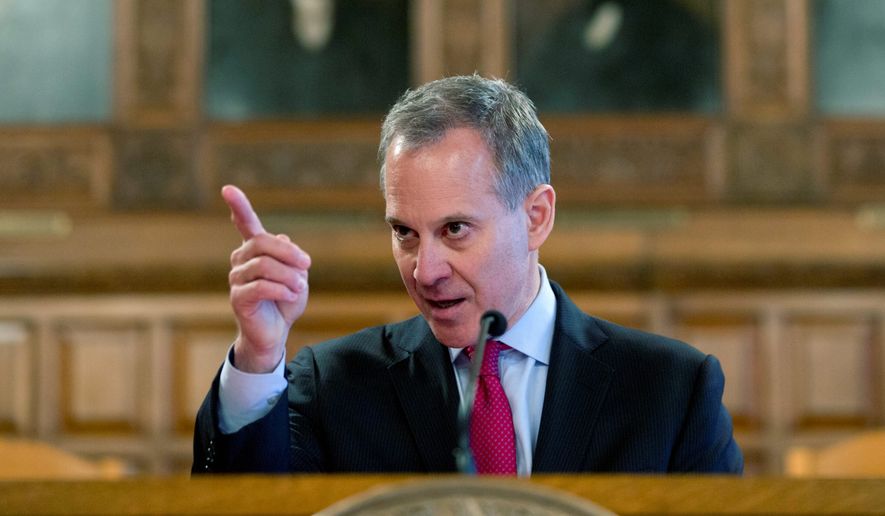Democratic attorneys general mounted a dogged defense Tuesday of their effort to prosecute climate skeptics amid signs that the 4-month-old campaign is deteriorating into a legal and public relations flop.
With a newly released poll showing an overwhelming majority of voters — including Democrats — oppose the investigation, the coalition of attorneys general pressed on, urging a federal court in Texas to uphold a subpoena filed by Massachusetts Attorney General Maura Healey against Exxon Mobil.
“No company — no matter how rich or powerful — is above the law,” New York Attorney General Eric T. Schneiderman said in a statement. “Exxon’s lawsuit in Texas is nothing more than an attempt to put its practices beyond the reach of state prosecutors.”
The amicus brief filed in support of the Massachusetts investigation comes with the coalition showing signs of fraying after suffering a series of setbacks.
So far only three of the 17 attorneys general — those in Massachusetts, New York and the Virgin Islands — have acknowledged starting investigations into Exxon or other entities since unveiling AGs United for Clean Power at a March 29 press conference.
Even those probes have run into problems. In June, Ms. Healey placed her investigation on hold, saying she would not enforce the subpoena until the court battle with Exxon was resolved, which could take years, according to a document obtained by E&E Daily.
SEE ALSO: Democratic prosecutors sought to boost Obama climate agenda with skeptics’ probe
The Virgin Islands probe all but collapsed in June after Attorney General Claude E. Walker agreed to drop a subpoena issued against Exxon, a month after he said he would withdraw subpoenas of the free market Competitive Enterprise Institute. Both Exxon and the institute had fought the subpoenas.
Meanwhile, Iowa Attorney General Tom Miller has so far refused to sign a common interest agreement allowing the prosecutors to communicate on their probes without disclosing the details to the public.
A January report in the Los Angeles Times said that California Attorney General Kamala Harris is investigating Exxon, but since then, her office has refused to provide details or even confirm that the probe is taking place.
While prosecutors typically refuse to comment on ongoing investigations, the coalition’s critics say the subsequent silence comes as an indication that some Democrats are having second thoughts about their March commitment in the face of fierce opposition.
“This is wrong, and, in the end, will be fully exposed,” said E&E Legal Institute senior fellow Chris Horner after the release of emails last week exposing the common interest agreement. “Perhaps that is why so many of the AGs have already walked away from this abusive campaign. It’s certainly why they are trying to keep it all secret.”
Republicans and free market groups have accused the attorneys general of abusing their prosecutorial authority in order to chill debate and advance an ideological agenda, while a Rasmussen Reports poll released Tuesday showed that 69 percent of likely voters oppose targeting climate skeptics.
“These AGs look very partisan, and I think they’re in a very controversial area here,” said political analyst Floyd Ciruli.
The attorneys general often compare their effort to the state and federal tobacco lawsuits that resulted in enormous settlements against the industry, but Mr. Ciruli said that “we’re nowhere near that, in my opinion, on climate change, either the urgency or necessarily the certainty.”
“You need to have, as with cigarettes, this sense of people dying today, this visceral sense of the connection between something scientifically declared and public policy, and that simply doesn’t exist,” Mr. Ciruli said. “This mainly looks like a witch-hunt to suppress countering views, and that is always very controversial in America.”
At the same time, the Democrat attorneys general have scored some victories. The party agreed in July to add a provision in its platform calling for the Justice Department to investigate “alleged corporate fraud on the part of fossil fuel companies who have reportedly misled shareholders and the public on the scientific reality of climate change.”
New Hampshire Attorney General Joseph Foster signed in April a common interest agreement indicating his decision to join the coalition even though he did not participate in the March press conference, which featured Vice President Al Gore Jr.
In that sense, the attorneys general may be better aligned with the party’s ascendant progressive wing than with Democratic voters as a whole. Only 21 percent of Democrats polled by Rasmussen said they supported prosecuting climate skeptics, while 28 percent said the debate over global warming is not settled.
Exxon is cooperating with the subpoena issued in New York, which has powers exceeding those of other states to investigate financial and shareholder fraud under the Martin Act, according to the motion filed Tuesday.
In Massachusetts, Ms. Healey is investigating whether Exxon and its supporters violated the state’s Consumer Protection Act.
“Like all state attorneys general, Attorney General Healey has the power to investigate potential fraud taking place in Massachusetts, just as I am investigating whether Exxon defrauded New York consumers and investors,” said Mr. Schneiderman.
In their 34-page brief, the attorneys general urged U.S. District Court Judge Ed Kinkeade for the Northern District of Texas to reject Exxon’s effort to block the subpoena, arguing that the company is attempting to use the federal courts to bypass state sovereignty.
“Protecting a state’s citizens from fraud, deception and other improper conduct is a principal and critical state law responsibility of state Attorneys General,” said the brief.
Missing from the amicus brief were three of the original 17 coalition prosecutors: Ms. Harris, Connecticut Attorney General George Jepsen and Virginia Attorney General Mark R. Herring.
• Valerie Richardson can be reached at vrichardson@washingtontimes.com.




Please read our comment policy before commenting.